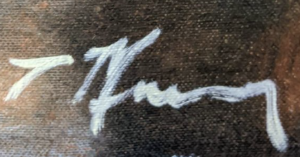This is Our Garden
December 22, 2017
The Garden of Eden, a historical event and a metaphor for creation and recreation, is gleaned from the stuff of tales. Eden directs much of our society’s moral compass, potentially instilling a healthy dose of guilt. Intrigued and perplexed by the apparent removal of one person from Paradise I decided to reinsert her, Lilith. And while I am at it I would like to add a few more of my own. The pages in between bring a sense of Topos, a sense of place, a tabla gardena, reflective of the hybrid nature of the original tale.
Landscapes, flora and fauna are heliotropes. Heliotropes are interesting ubiquitous verities found in nature. Like heliotropes, human truths, the ultimate story of our lives, are attracted to whatever feeds and nurtures us. This phenomenon is beyond a natural law; it is the inexplicable shape of our existence. In my work patterns, layering flowers, plants and figuration are metaphors for these blueprints of existence. The work itself is a result of an internal heliotrope following the transformation of a painting, drawing, sound installation, photograph, performance or collaboration through a process not unlike the phenomenon of natural laws. I approach process like a “code”, as a “personal paradigm” or descriptor of time and as a vehicle of evolution. Similarly, the garden metaphor works as an expression of this code, a meditation on color events, focus, subjugation, air as breath, and complexity as mystery. Finally, the heliotrope is the expression of transformation and variation; a node where individual identities collide and intersect.
The desire to make an image is a practice that helps me to describe our world. Interpersonal relations and our place on this planet are simultaneously sacred and profane. My work is an expression of both, filtered through both unique and generalizable experience. Scribing through imagery, the very act of defining is a convergent process, one that is ultimately limiting.
Awareness teeters between the definitions of clarity and abstracted experience. Our interactions are layered heliotropes, patterns that interrelate and resonate , mutable, changeable and at times converging or divergent.
Adam, Eve, Lilith, and Jacques Bautiste revel on the same stage. The Coyote is not Beelzebub, but rather the Litmus Test, a goad. Interpreting and reinterpreting is a constant source of amusement and devotion.
Each new work mines a slightly new exploration or a miniscule facsimile of this nature. I consider this my journey, though admittedly, I favor the search over the finality and banality of “truth”.
Copywrite 2013, Thomas Murray




